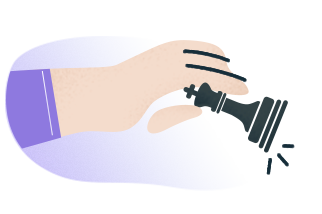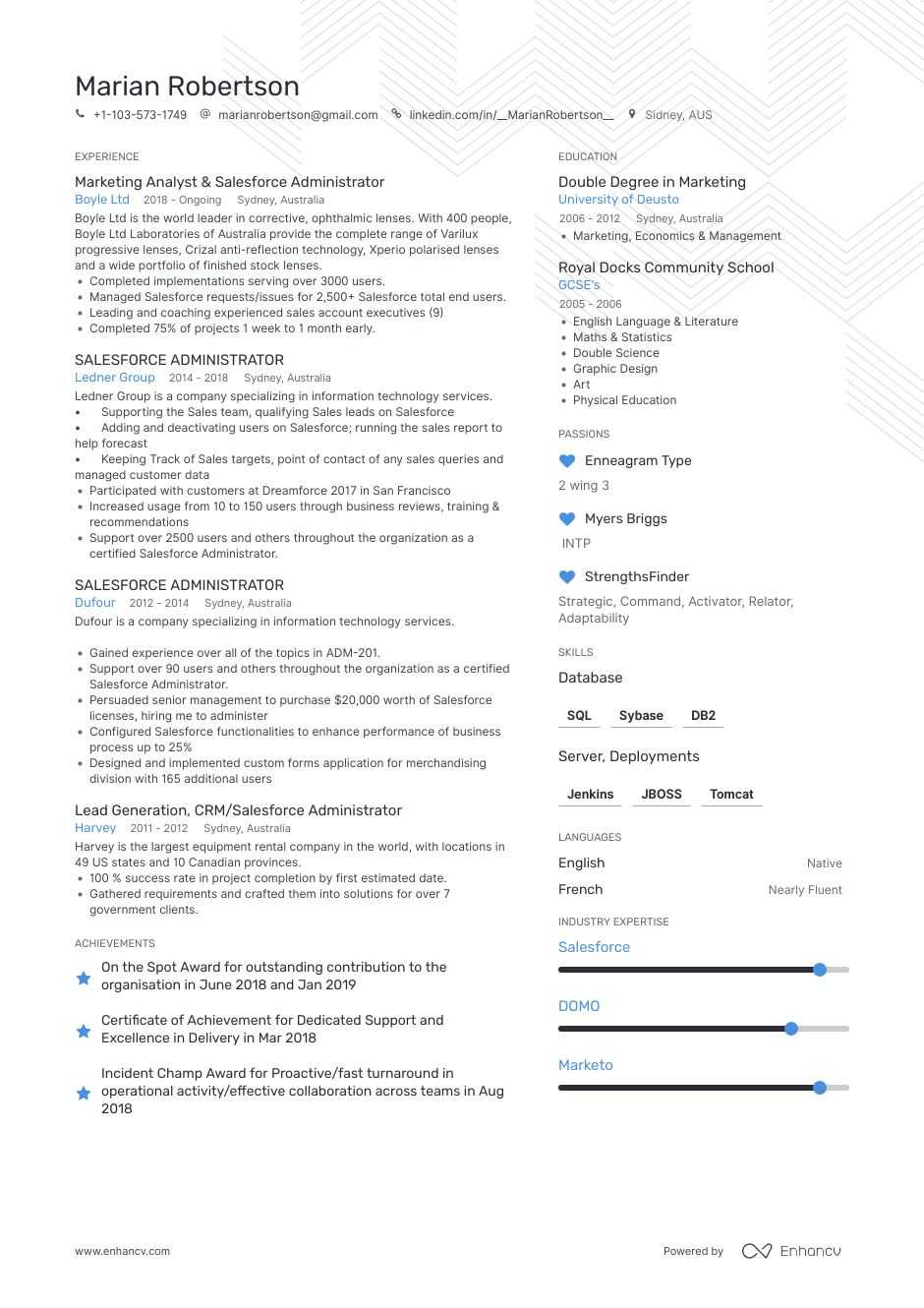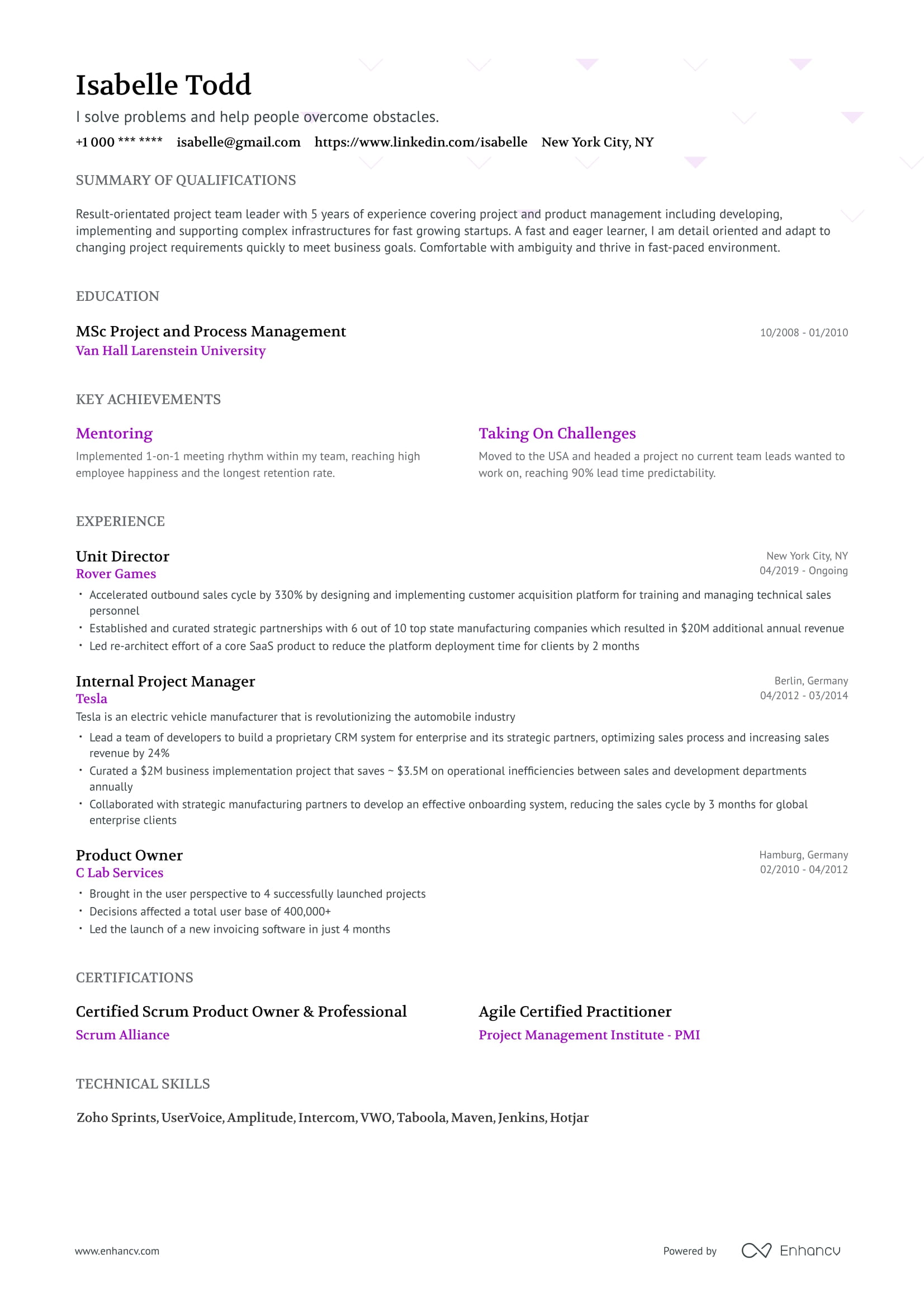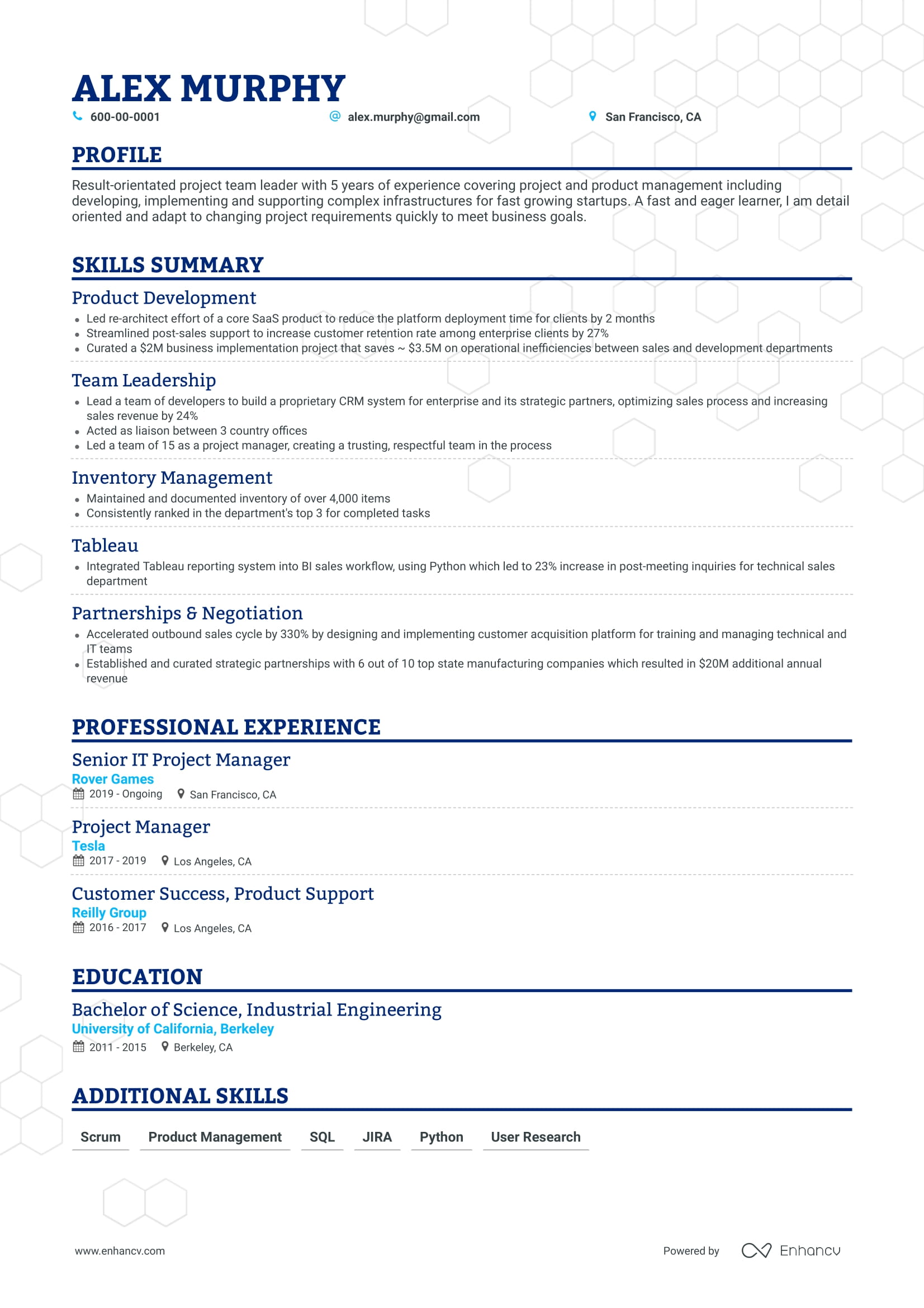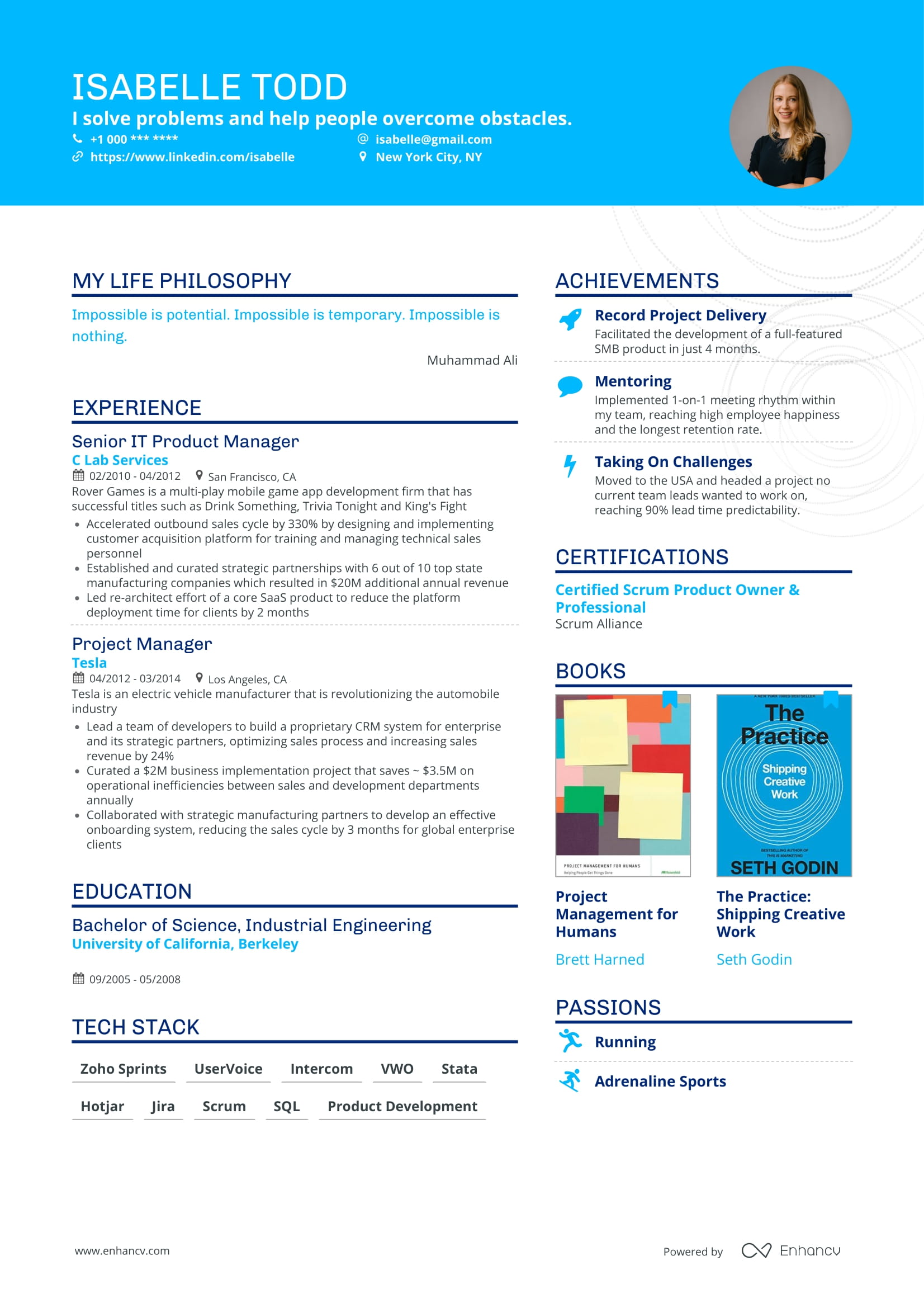Example Salesforce Resume - Browse more resume templates and build a stand-out resume
Writing your Salesforce resume?
Whether you’re a Salesforce BA, developer or admin, you’ve come to the right place.
But first, let’s take a short look at this case study.
Meet Bob, a tech-savvy graduate who just earned his CS degree.
He spent the better part of his student years maintaining the university module and persona integration app, that happened to be on Salesforce.
He got enough money to cover his tuition fee, and took a deep interest in Salesforce.
Bob didn’t stop there, but also hiked dozens of Trailhead paths and got over 70 badges in his pockets.
What’s more, Bob just completed his Level II SF Developer Certificate.
But now he realizes he’s up against a tough crowd competing for the next big job opening.
A job opportunity popped up at DocuSign - and given the fact that he's got experience in dealing with data and documents, Bob starts planning a stand-out Salesforce resume.
Whether or not you’ve been in Bob’s shoes, you’re here because you want to end the no-call interview spell.
Or, simply because you want to see if you’re not missing a tiny detail in your Salesforce resume.
Can we start writing already?
Here’s what our Salesforce resume guide will show you:
- Real Salesforce resume examples that win interviews 9/10 times;
- How to comprehensively present your resume header and summary to catch HRs’ attention;
- Different ways to bring your value proposition in front of recruiter’s eyes;
- How to focus on your past achievements and big career highlights to build up your case;
- What’s the proper way to address both your tech and soft skills on the resume;
Salesforce resume samples
Read our Salesforce resume examples - for any Salesforce job
Salesforce Administrator resumes
As a Salesforce Administrator, you’re expected to care equally about business, people and technology.
Salesforce Admins act as challenge-solvers who possess extensive knowledge and understanding of Salesforce platform functionality, while sympathising with user issues.
As a Salesforce Administrator, you’re more than a Salesforce expert - you’ll assume the role of the leader in your organization - formal or informal alike.
So, try to mention in your Salesforce Admin resume that you’re a problem-solver and a great communicator. In order to make those stand out - provide cases where you had to use them.
Salesforce Developer resumes
Are you familiar with Salesforce platform limitations but also the business opportunities it creates?
Recruiters will pick you on concrete projects and you’d better provide concrete metrics and results to prove your worth.
Pay special attention to the scale of orgs you were responsible for - different org sizes expose you to different technologies, and require certain set of skills.
Lastly, consider how to add your soft skills to the resume.
You’ll need to find balance between tech and people skills, as you’ll find yourself communicating with different stakeholders on a daily basis.
So, use real situations from your background to back up your claims.
Salesforce Business Analyst resumes
It’s strange they tell you you’re technically qualified to be a Salesforce BA, but then, your resume gets rejected.
It might be because you’re not picking up the right keywords, or because you didn’t transform the job description in the exact skills and competencies they need from you.
How you frame your experience largely depends on the position you’re applying for, as different BA jobs will accent on different skills.
You might be asked to work with diverse, cross functional teams. Or to regularly present your analysis findings and advise stakeholders on the right solution.
By reading the job description carefully, you’ll start seeing a pattern which will help you find and showcase a handful of skills to get you the interview.
Finally, make sure you give an example or two where you show how your data gathering and analysis skills helped you saw solutions beneficial for the business.
What it takes to create a perfect Salesforce resume outline
Let’s estimate that for every open Salesforce position in a big org, there’s around 100 candidates.
That makes over 3500 applications for just 35 open positions.
Resumes that get picked from such a big pile check off more than a few boxes.
First off, your Salesforce resume must be eye-catching and easily scannable.
You should also know that humans read in a common pattern. When you scroll past the next article in your favourite magazine, observe how you skim.
You’ll probably scan the first heading, and the first couple of sentences from each paragraph before moving on.
If it grabs your attention, you’ll go on. Otherwise, you’re off to the next one.
It’s the same deal with resumes: keep your value proposition stories in the most important sections of your resume:
- Header (containing your contact data);
- Summary or objective (just after your contact info);
- Experience in reverse-chronological order (first bullet points should contain your strongest selling points);
- Skills section - both technical and soft skills
- Education and certificates
Every second Salesforce resume gets the same reverse-chronological order full of job responsibilities.
To stand out, you need to use the above resume sections in a specific template so you show business impact with key numbers and results.
Depending on the Salesforce position you are applying for, you may have to give advantage to a specific section, i.e. technical skills or achievements.
Now, let’s see how to combine those sections in a coherent layout.
Let’s help you out with the right resume template for Salesforce
Picking out the appropriate Salesforce resume template very much depends on how you want to appear as a candidate.
Here are the most common resume layout types, each sending its own unique message.
- Single column resume layout - this template is perfect for people who’re looking for entry-level positions in Salesforce.
- Double-column resume layout - applying for a big org, and you’ve got a ton of experience to pack in a single page? Use this template, or its condensed variation.
- Creative resume layout - over 15 000+ companies in the world use Salesforce. Some of them value creative individuals, with their own voice and vibe. If you’d like to stand out from the rest of the candidates, choose a creative layout with more personal sections.
Whichever format you choose for your Salesforce resume, remember that:
- Salesforce’s jobs are different - even though there are some overlaps between SF admins and devs, it’s an entirely different thing to apply as a consultant. You can’t pull the same layout for both.
- Be sure your Salesforce certificates are prominent at the top - they might not be a key to your job, but they help recruiters see your initiative and willingness to keep up with the platform’s evolution.
- Your resume should work pass initial ATS scan (applicant tracking system) - big companies are heavily using them nowadays to sift through hundreds of applications. Make sure your resume packs in keywords from the job description.
- Save it as a PDF file.
Time to go over each separate section in detail. Pay attention to the specific resume examples and see how to apply them in your case.
Struggling with your Salesforce resume header? See concrete examples below
The resume header paints the first colours of your background and your value proposition picture.
You have to make sure your role is visible at the top.
Your resume header will give headhunters a complete overview of your social profiles and Salesforce projects you’ve been doing so far.
But that’s only in case you don’t miss out on the following elements:
- Your name, location and current job title;
- Contact data (professional looking email and your phone number is enough);
- Springboard links (LinkedIn/Trailhead profile/Personal blog or vlog);
- Certifications - you might be certified as a Salesforce Advanced Administrator or CPQ Specialist. You can add the cert after your name/title.
Let’s pay some special attention to your job title.
It’s common for a Salesforce expert to have diverse experience with the platform.
You might get to see people who’ve started as consultants, but are now fully-fledged Salesforce admins.
So avoid listing every single job title and qualification you have - make your resume tailored to the job.
The last thing you want is to sound all over the place in your header. Let’s improve it.
Looking at both, the bottom one excels with prominent links, job title and qualifications.
Most importantly, it’s specific and tailored to the job ad in question.
It packs essential info about the candidate in just two lines.
Let’s transfer that efficiency in the next section.
How to write a resume summary or objective for Salesforce resumes
When you’ve got a solid number of years behind your back in Salesforce, you’re looking to write a career summary.
And, if you’re just entering the Salesforce field or changing careers, you might have to go for a career objective.
The small but important difference is, that objectives show what the candidate aims to achieve in the new workplace with their given skillset.
Treat your summary as a sales pitch that will give your background valuable context.
A great Salesforce resume summary packs certain keywords and specific experiences hiring managers will look for. And it will all depend on the position you’re applying for.
For Salesforce Business Analysts, frequently used keywords might be: Workflow diagrams, Data integrity, Data gathering, Data documentation, Data analysis, GAP analysis.
In Salesforce Administration, field, HR managers will look for: Customizing profiles, Dashboards, Reporting, Page layout, Sharing rules, User support, Login audits.
When it comes to Salesforce devs, recruiters sniff out: Apex, VisualForce, Lightning, Salesforce API, SOQL, Dashboards.
Let’s see two Salesforce Administrator resume summary examples to illustrate the point above.
When you see both summaries in front of you, it’s clear as day which gets the upper hand.
The second one takes just 2 sentences to prove their worth.
A recruiter doesn’t have to move back and forth to know:
- You’ve got certifications
- You have over 8 years of Salesforce experience
- You’ve worked in a big org
- What technologies you were exposed to
Apply the same principles in case you’re writing a summary for a different Salesforce field.
How to make your Salesforce resume experience stand out
One word: results.
The longer your experience with Salesforce, the higher the chance you’ve got important career events to tell about.
What led you to apply for that specific job?
Observe the following experience bullets:
- Responsible for doing daily configuration of Salesforce functionalities.
- Improved org efficiency by building Apex triggers and classes.
Everyone is supposed to do that.
Unless you mention any specific achievements, your bullet points here will be way off the line.
Let’s rewrite them, but this time, with impact in mind.
- “Enhanced business org performance by 45% by transfiguring Salesforce functionalities.”
- “Improved org efficiency by 30% by building Apex triggers and classes.”
See below a couple of examples that further make the case.
2 samples of Salesforce resume experience sections
Ok, this resume doesn’t go into the specific impact you made in this position.
It reads as a simple job description.
Below is its improved version. Notice the differences.
Now, this one screams numbers and results.
It’s how you should approach this section - think of your biggest career achievements and pack them in short bullet points.
This is the time to sound as much impressive and clear as you can.
At least, the first couple of bullet points in your resume should contain a number.
It’s not always easy to dig up the numbers, but rest assured, there are other ways to prove your value proposition.
User count in your previous Salesforce orgs is one, for starters.
If you were exposed to more users, this means technologies, challenges and features of the Cloud are something that you’d never dabble in a small company.
Salesforce Admins, Developers and Business Analysts are more likely to have solved issues with indexing, or used features as Translation Workbench.
Lastly, you’ll increase your chances of being hired if you tell a narrative in your summary.
Put yourself in the recruiter shoes.
Instead of going through dozens of resumes talking about dashboard building or workflows configuration for Sales Cloud, wouldn’t it be great to read how the applicant solved interesting problems?
- Can you tell a story about your past experience and make it special?
- Did you tackle an unbelievably large amount of integrations?
- Did you maximize your cloud storage limits?
- Has, by any chance, your organization been talked about on Dreamforce?
These are just some small cogs in the grand narrative your resume is supposed to tell.
How to talk about your experience on Entry-Level Salesforce resume
So, how do you invent experience on your resume if you don’t have any?
Let’s show you the way.
What if you’re changing careers at the moment?
Or just graduated from university or Trailblaizers academy?
Salesforce community is arguably one of the strongest in tech nowadays.
There are multiple ways (Especially through Salesforce university) to get involved in the platform.
Demonstrating that on your resume is a key sign you’re going to be a great asset.
While you may not be the next key speaker at Dreamforce, you’ve most likely worked in an environment that required the real life skills needed to get the job done.
Let’s see what can separate you from the pack.
- Examples of experience - show your innovativeness by matching university or volunteer projects to real world skills.
- Demonstrate your activity on Trailhead - companies appreciate seeing a candidate with earned badges and completed trails (but make sure they are at least 50). This shows you’ve been exposed to technologies you’ll work with in the future.
- Do your homework - carefully read the job description and study the company in detail before you apply. Recruiters notice if you managed to understand how your skills and personality fit the job description.
- Be specific in terms of the role you’re pursuing - you might startle upon the many opportunities Salesforce presents to you. Send a vague resume that shows no real interest in a single career path, however, and you risk going in the pile.
Of course, if you’re creating an entry-level Salesforce resume, your education will take a pivotal role.
Adding certifications and education on a Salesforce resume
“Do I need a University degree to start a career in Salesforce?”
That’s a question often popping up in Salesforce, Reddit and other tech forums.
And, the answer might sound pretty obvious to some - it’s not the #1 factor in getting a job.
Salesforce’s own certification system has reached a point where it has become somewhat of an industry standard.
However, a formal background does have a place in Salesforce environment.
Issues with SF implementation arise if people don’t have the necessary discipline and software development expertise that formal education provides.
You might have seen devs who haven’t adopted a single trigger pattern.
Or, colleagues trying to rebuild Standard features because they don’t fully understand them.
Data models can get messed up.
Here comes the expertise gained from studying and implementing Object-Oriented Programming, high-level data architecture, or SQL.
So, degrees in Information systems, Computer Science or development background can be of huge help. Especially if you couple them withTrailhead certifications and badges.
With that being said, if you’re applying for your first Salesforce job, you may want to expand on your education section with the following data:
- Awards
- Your GPA (only if you believe it’s relevant)
- Coursework, projects and relevant lessons
What’s the proper way to include your skills on Salesforce resume
There’s a slight difference between how you describe soft and hard skills.
Let’s break them down and take care of each in the best way possible.
How to describe technical skills on your Salesforce resume
Technical skills here will center around your experience with Salesforce platform.
You’ll either know it or not. You don’t really have to go much in-depth about it.
Recruiters can infer from your experience section how skilled you are in Salesforce analysis or administration.
However, tech skill section will help you get past ATS (Applicant Tracking Software) that will check your resume for technologies employers want to be sure you have.
Therefore, a simple list of your top technical skills relevant to the job description gets it done.
Top 14 Tech Skills to Feature in Salesforce resumes
- Salesforce
- Business process
- System & Network configuration
- Data validation
- System administration
- Lightning
- Apex
- Visualforce
- SOQL
- Web Services
- Data Analysis
- Business Analysis
- Data Management
- Requirement Management
How to describe soft skills on a Salesforce resume
While Salesforce industry is built around technical skills, soft skills are gaining in importance.
However, if you just throw them out there without backing them up, you won’t impress.
Put simply, anyone can say they are a great team-player or are the most organized people.
Show, rather than tell, that you have those skills by giving real examples.
See how it’s done?
You need just a quick glimpse to know how this candidate’s soft skills helped them get the best out of a situation.
That’s what distinguishes your resume from the rest of the resumes recruiters looked at.
Whether you are an #AwesomeAdmin or on your #JourneyToCTA, advising and leading clients, and other departments to the best possible platform solution is a must-have skill.
Take a look at the below list of skills and select those you can demonstrate mastery of.
15 Soft Skills you need on your Salesforce resume
- Communication
- Writing
- Problem-solving
- Organisation
- Project management
- Teamwork
- Customer service
- Creativity
- Confidence
- Openness
- Technical Writing
- Active listening
- Conflict resolution
- Negotiation
- Detail-Oriented
Final takeaways: what makes a perfect Salesforce resume
- Make sure to explain your Salesforce specialization - be it in development, administration, consultancy or analysis.
- Present a perfect blend of analytical and people skills, as well as technical inside-out knowledge of Salesforce platform.
- Show your experience as a set of notable results that prove what value proposition you can bring to your potential employer.
- Talk about your relevant education and mention your activity in Trailhead - be it as a super user helping others, or as a self-learner.
- Frame each technology and tool in specific real-case scenarios from your line of work, so you can prove your experience.
- Pay special attention to the scale and breath of the Salesforce orgs you were administering and/or analysing.
